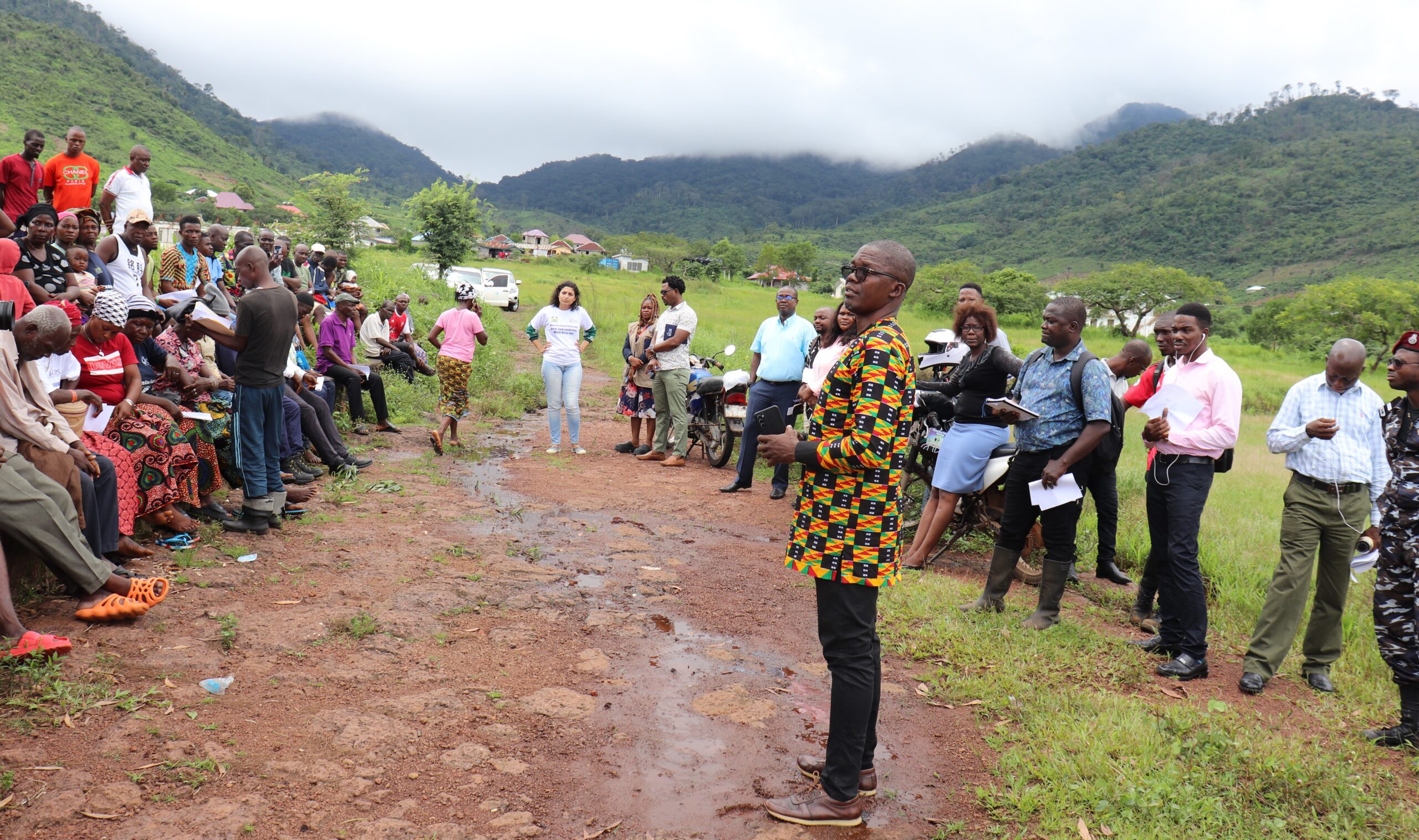Freetown, August 21-The Western Area Peninsula Water Fund (WAPWF) has handed over the construction site for the erection of a 1.5 km perimeter fence to two construction firms, in Tombo and Madina communities, in the Western Area Rural District. This handing over which took place in the Tombo community comes after weeks of stakeholder consultation and community engagement in these two communities. The event attracted local authorities, community stakeholders, government line institutions, and the security sector.
This construction work is a continuation of the 90km proposed protective barrier around the Western Area Peninsula Rain Forest meant to keep encroachers away and reduce destructive human effects on the rainforest. 0.45km of the barrier had already been erected in the River No.2 area, to wade off encroachers in that part of the peninsula.
This protective barrier is made up of giant concrete pillars 10 meters apart from one another, and fitted in the middle with barbed wires. These concrete pillars are always erected in collaboration with the community people, as community inclusion in the process goes a long way to ensure ownership.
Kadiatu Fofanah is Chair Lady of the Tombo Community, she highlighted how water issues in their community is affecting women, ranging from caring for homes and babies, to rape, sexually-transmitted diseases and teenage pregnancy among girls who spend long hours in search of drinking water. She further highlighted how land grabbing and other harmful human practices have reduced the yield of water that reaches the community. She said the Tombo and Madina communities wholeheartedly welcome any initiative to rescue their dying water sources.
The Western Area Peninsula Nation Park is home to many endangered plant and animal species. It is also most of the Wester Area’s freshwater sources. It is Guma Valley Water Company’s primary source of water which is processed and sent to communities in Freetown and its environs. Production Manager at the Guma Valley Water Company- Ing. Mohamed Koroma said the different watersheds within the peninsula rainforest used to collectively be a viable water source all year round, but have drastically deteriorated due to harmful effects on the water sources. He said the yield of the watersheds now depends on the season of the year-abundant water during the rains and scarcity in the dries. He said they are happy to participate in any effort to protect the few water sources left within the rainforest.
The Planning, Research and Operations Officer at the National Water Resources Management Agency- Ing. Arthur Garber, while giving a presentation said water is more important to humans than any other natural resource, as life is just impossible without water. Ing. Garber said by virtue of the Agency’s mandate to manage the country’s water resources, it serves as the main implementing partner of the Fund and has the power not only to protect water resources, but to prosecute defaulters whose actions threaten these water resources. He highlighted some of the issues societies face when water is available, or when available but not fit for purpose. He encouraged the communities to make it a duty to protect the peninsula rainforest which hosts their water resources for both present and future generations.
The Western Area Peninsula Rain Forest is a protected area that falls within the mandate of the National Protected Area Authority. Ansumana Babah Turay is the Authority’s Terrestrial and Ecosystem Manager. He says deploying of 40% of their total human resource to just the peninsula rainforest is a clear testament of their commitment to protecting all the properties of the rain forest.
Kareen Zabow, the Director of Urban Resilience at the Catholic Relief Services (CRS) says it was a very fulfilling moment to get these communities to understand and agree to help protect the rainforest, as so many community people were engaged in daily livelihood activities that were detrimental to the health of the rainforest. She further said protecting the rainforest with concrete barriers will not only prevent mudslides and floods- two natural disasters that have recently hit Sierra Leone very hard, but it will also increase the lifespan of these watersheds within the rainforest by 67%.
The Western Area Peninsula Water Fund is a nature-based, single-basket approach that offers effective and financially sound means to address the growing water security challenges facing Freetown and the surrounding Western Area Peninsula. It does not only ensure water security by deterring encroachers, but also creates a sustainable funding mechanism for the protection of the national park. The Fund is collectively implemented by partners like National Water Resources Management Agency, the National Protected Area Authority, Guma Valley Water Company, Freetown City Council, Ministry of Lands and Country Planning, Guma Valley Water Company, Caritas Freetown, Youth Action for Relentless Development Organization, with support from CRS and funds from The Nature Conservancy.

